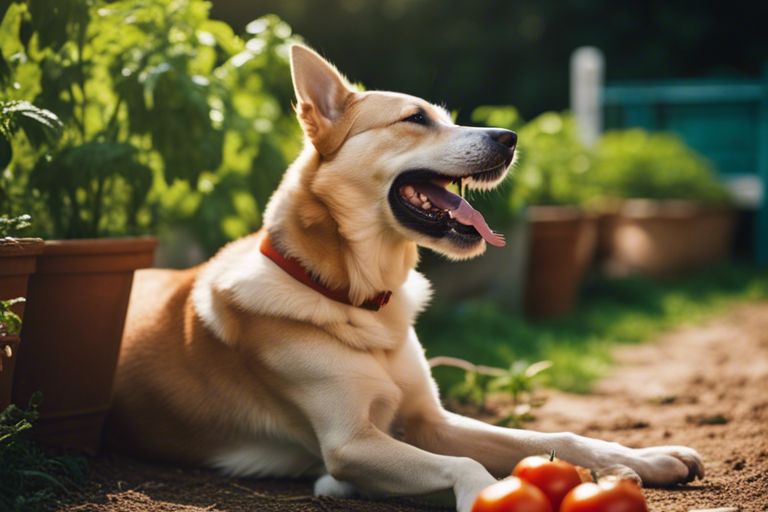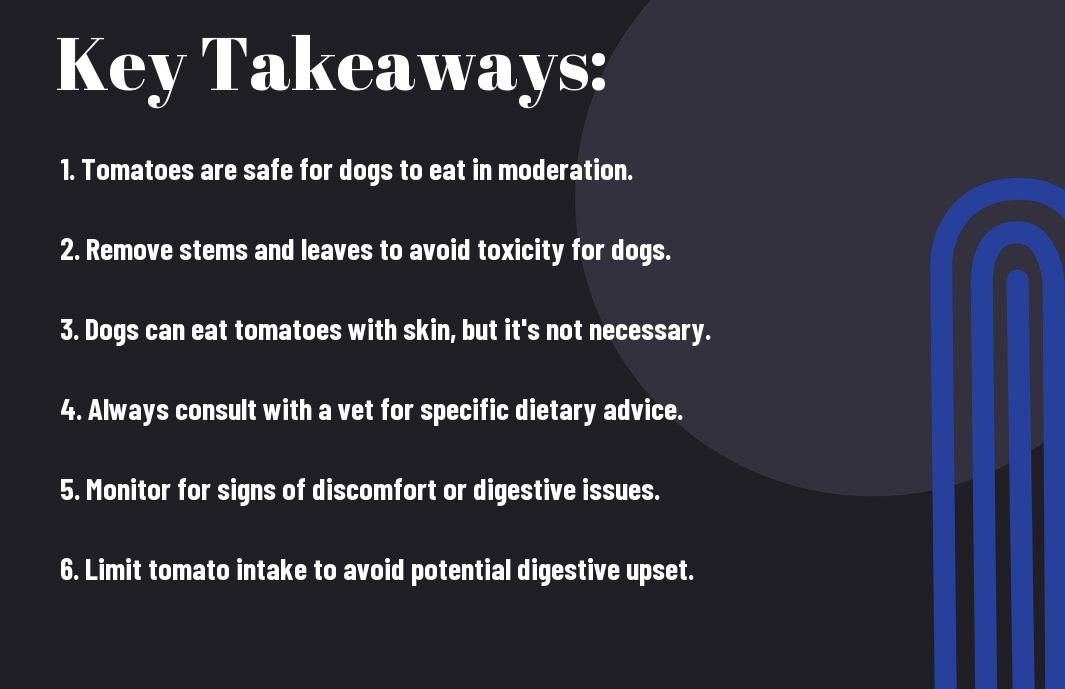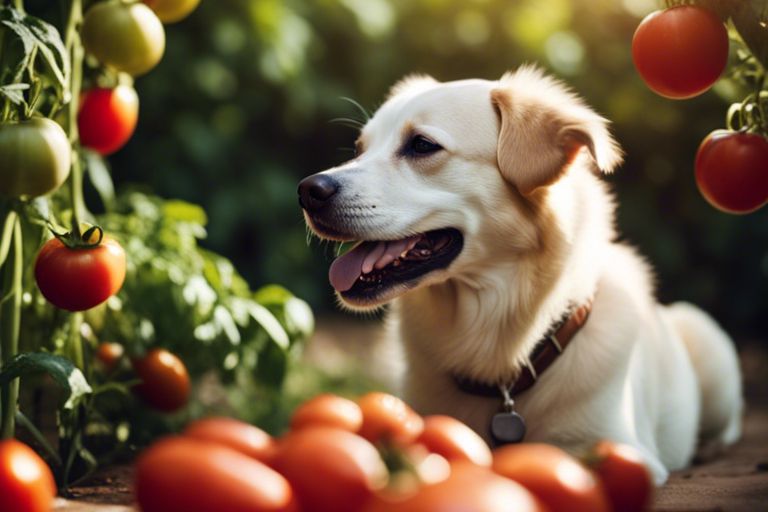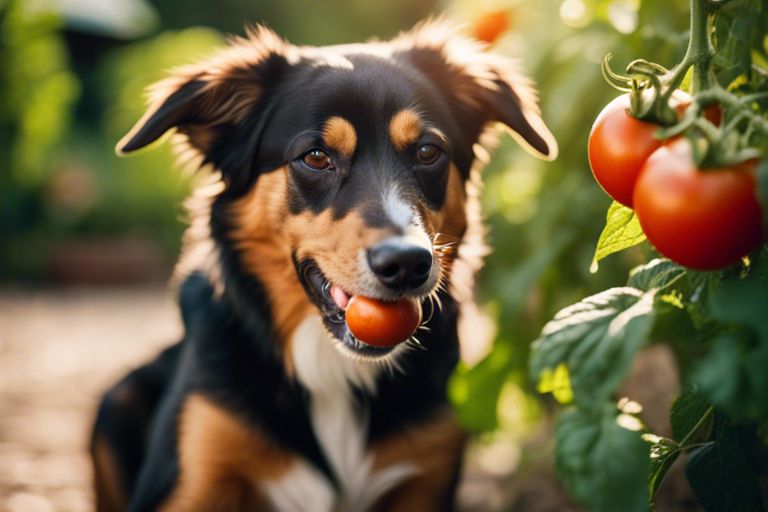Many dog owners wonder, can dogs eat tomatoes with skin? It’s important to know that while tomatoes themselves are safe for dogs in moderation, it’s best to remove the skin before giving them to your furry friend. The skin and leaves contain solanine, which can be harmful to dogs if consumed in large quantities. Get more information about what foods are safe for your canine companion from Can Dogs Eat Tomatoes? Are They Safe?.
Key Takeaways:
- Tomatoes are safe for dogs to eat: Tomatoes are generally safe for dogs to consume, but it is important to remove the stems and leaves as they contain toxins that can be harmful to pets.
- Tomato skin may cause digestive issues: While the flesh of a tomato is safe for dogs, the skin can be difficult for them to digest and may cause gastrointestinal problems such as upset stomach or diarrhea.
- Offer tomatoes in moderation: If you choose to feed your dog tomatoes, it is best to offer them in moderation and monitor for any adverse reactions. Always consult with your veterinarian before making significant changes to your pet’s diet.
The Nutritional Value of Tomatoes
To understand the nutritional value of tomatoes for your dog, you can refer to resources such as Can Dogs Eat Tomatoes? for detailed information. Tomatoes are a great source of vitamins and minerals, making them a healthy addition to your dog’s diet.
Vitamins and Minerals in Tomatoes
On the vitamin front, tomatoes are rich in vitamin C, which is crucial for your dog’s overall health and immune system. They also contain vitamin K, biotin, and vitamin E. With respect to minerals, tomatoes boast potassium, which plays a crucial role in proper heart and muscle function, as well as manganese and copper.
Antioxidant Properties of Tomatoes
Antioxidants are compounds that help protect cells from damage caused by free radicals, and tomatoes are packed with these beneficial substances. Lycopene, a powerful antioxidant found in tomatoes, can help combat oxidative stress and reduce the risk of chronic diseases in your furry friend.
With their impressive array of vitamins, minerals, and antioxidant properties, tomatoes can be a nutritious and flavorful treat for your dog. Just be sure to feed them to your pup in moderation, especially if they have any existing health conditions or sensitivities.
Can Dogs Eat Tomatoes?
Assuming you’re a dog owner who loves to share your favorite snacks with your furry friend, you might be wondering if tomatoes are safe for dogs to eat. The answer is both yes and no. While ripe tomatoes in small quantities are generally safe for dogs and can even provide some health benefits, there are certain parts of the tomato plant that are toxic to dogs.
The Toxic Compound in Tomatoes
The toxic compound in tomatoes that poses a risk to dogs is called solanine. Solanine is found in the stems and leaves of the tomato plant, as well as in unripe green tomatoes. When ingested in large amounts, solanine can be harmful to dogs and cause symptoms of toxicity.
Symptoms of Tomato Toxicity in Dogs
One of the common symptoms of tomato toxicity in dogs is gastrointestinal upset, including vomiting and diarrhea. If your dog consumes a large amount of tomato plant material or unripe green tomatoes, they may also experience difficulty breathing, confusion, weakness, and even cardiac effects. It’s imperative to monitor your dog closely if they have ingested any part of the tomato plant and seek veterinary attention if they show any concerning symptoms.
Another important point to consider is that the tomato skin and seeds can be difficult for dogs to digest and may cause gastrointestinal issues, such as blockages in the intestines. If you do decide to share ripe tomatoes with your dog, it’s best to remove the skin and seeds to reduce the risk of any digestive complications.
The Role of Tomato Skin
Nutrient-Rich Tomato Skin
Keep in mind that tomato skin is packed with nutrients that can be beneficial for your furry friend. The skin of tomatoes contains high levels of fiber, vitamins A and C, as well as antioxidants that can aid in your dog’s overall health and wellbeing. These nutrients play a crucial role in supporting your dog’s immune system and promoting healthy digestion.
Potential Risks of Tomato Skin for Dogs
Any concerns about the skin of tomatoes mainly revolve around the potential risks it poses to your dog’s digestive system. Tomato skin is slightly tougher to digest compared to the fleshy part of the tomato. If consumed in large amounts, it may lead to gastrointestinal issues such as stomach upset or even blockages, especially in smaller dogs. Additionally, some dogs may be allergic to tomatoes, including their skin, which can result in skin irritation or other allergic reactions.
Any drastic change to your dog’s diet, including introducing tomatoes with skin, should be done gradually and under the guidance of your veterinarian. It’s important to monitor your dog for any signs of discomfort or adverse reactions after consuming tomatoes with skin. If you notice any unusual symptoms, such as vomiting, diarrhea, or lethargy, discontinue feeding tomatoes and consult your vet immediately.
Feeding Tomatoes to Dogs Safely
Unlike some other fruits and vegetables, tomatoes are generally safe for dogs to eat in moderation. However, there are some precautions you should take to ensure that your furry friend can enjoy this juicy treat without any adverse effects.
Removing Toxic Compounds from Tomatoes
For starters, it’s imperative to remove any stems, leaves, and other green parts from the tomato as they contain solanine, a toxic compound that can be harmful to dogs if ingested in large amounts. While the amount of solanine in tomatoes is typically low and not a significant concern, it’s always better to err on the side of caution and eliminate these parts before offering your pup a slice.
Preparing Tomatoes for Canine Consumption
From a preparation standpoint, slicing or chopping the tomato into smaller, bite-sized pieces can help prevent choking hazards and make it easier for your dog to digest. Additionally, cooking the tomato can also be a good idea as this process helps break down the tough skin and make the fruit easier to chew and digest for your furry friend.
Canine experts also suggest deseeding the tomato before feeding it to your dog, as the seeds can sometimes cause gastrointestinal upset or blockages, especially in smaller breeds. By taking these simple steps, you can safely incorporate tomatoes into your dog’s diet as an occasional treat without any worries.
Health Benefits of Tomatoes for Dogs
Despite their small size, tomatoes are packed with crucial nutrients that can benefit your dog in various ways. Here are some of the health benefits of tomatoes for dogs:
Supporting Healthy Digestion
Dogs can benefit from the high fiber content found in tomatoes, as it supports healthy digestion. Fiber is crucial for maintaining regular bowel movements and can help prevent constipation in dogs. Additionally, tomatoes contain natural enzymes that can aid in the digestion process, making it easier for your dog to absorb nutrients from their food.
Boosting Immune System Function
An important benefit of tomatoes for dogs is their ability to boost the immune system. The vitamin C found in tomatoes is a powerful antioxidant that helps protect cells from damage and strengthens the immune system. Including tomatoes in your dog’s diet can help keep them healthy and better equipped to fight off infections and illnesses.
For instance, vitamin C plays a crucial role in the production of white blood cells, which are responsible for fighting off bacteria and viruses in the body. By incorporating tomatoes into your dog’s meals, you can help support their immune system and overall well-being.
Potential Risks and Precautions
Allergic Reactions to Tomatoes
With any new food introduced to your dog’s diet, there is always a risk of allergic reactions. Tomatoes contain certain compounds that may trigger allergic responses in some dogs. Symptoms of a tomato allergy in dogs may include itching, redness, swelling, or gastrointestinal issues such as vomiting or diarrhea. If you notice any of these symptoms after feeding your dog tomatoes, it’s best to consult your veterinarian immediately.
Interactions with Medications and Health Conditions
Tomatoes can interact with certain medications and exacerbate existing health conditions in your dog. If your dog is on medication or has a health condition such as kidney issues, it’s vital to consult your vet before adding tomatoes to their diet. In some cases, tomatoes can interfere with medication absorption or worsen health conditions, leading to potential complications.
Interactions with medications and health conditions vary from dog to dog, so it’s crucial to seek professional advice to ensure that tomatoes are safe for your furry friend. Your veterinarian can provide personalized guidance based on your dog’s individual health needs and dietary requirements.
Summing up
On the whole, it is generally safe for dogs to eat tomatoes with skin in moderation. The skin of a tomato contains nutrients that can be beneficial for your furry friend, but the seeds and stem should be avoided. Remember to always consult with your veterinarian before introducing any new food into your dog’s diet, to ensure they are healthy and have no underlying conditions that may be affected by certain foods.
FAQ
Q: Can dogs eat tomatoes with skin?
A: Yes, dogs can eat tomatoes with skin. However, it’s important to remove the stems and leaves as they contain toxins that can be harmful to dogs.
Q: Are tomatoes safe for dogs to consume?
A: Tomatoes are generally safe for dogs to eat in moderation. They are a good source of vitamins and nutrients, but it’s important to remove the green parts and only feed ripe tomatoes.
Q: What are the benefits of feeding tomatoes to dogs?
A: Tomatoes are rich in vitamins A, C, and K, as well as antioxidants. They can help support your dog’s immune system, vision, and overall health when given as an occasional treat.
Q: Are there any risks associated with feeding tomatoes to dogs?
A: While ripe tomatoes are safe for dogs, green tomatoes and the stems and leaves of the plant contain solanine, which can be toxic to dogs. It’s best to avoid feeding these parts to your furry friend.
Q: How should tomatoes be prepared for dogs?
A: To safely feed tomatoes to your dog, wash them thoroughly, remove the stems and leaves, and cut them into small, bite-sized pieces to prevent choking. Recall, tomatoes should be given in moderation as part of a balanced diet for your pet.
Are strawberries toxic for dogs
Demystifying Anal Gland Issues in Dogs: Your Comprehensive Guide from the American Kennel Club




